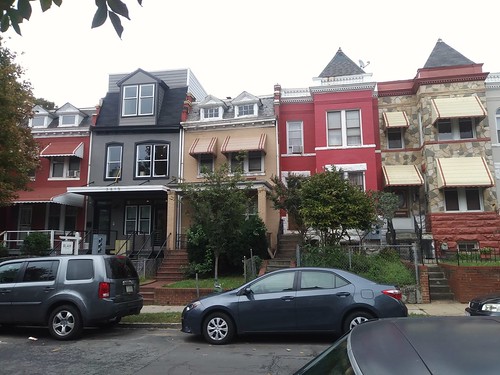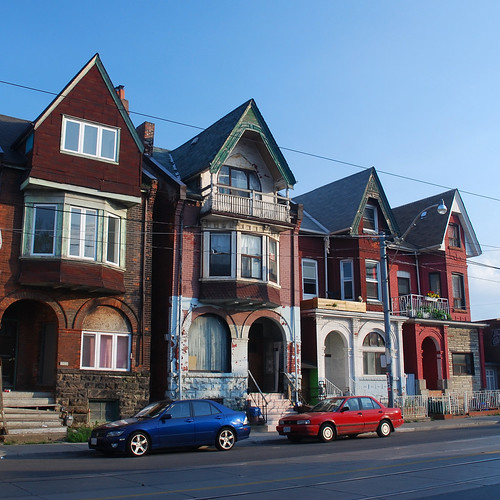Toronto Globe & Mail article comparing Montreal and Toronto and finding Montreal better
One of the points made in the piece, "Toronto, take a lesson from Montreal: Cities are for people," is that housing is cheaper, especially for renters, in Montreal. From the article:
The most crucial is housing affordability, which in Toronto is nonexistent. The average house cost $772,400 in May and chances are that average house is either very small, or in need of renovations. The rental vacancy rate is shockingly low –hitting 1.1 per cent in late 2017 – and purpose-built rental units saw costs spike renter’s city. Aside from being a basic human right, secure housing makes a city more vibrant and relaxed. It’s evident in almost every daily interaction, an easy, artistic vibe that’s just in the air.Partly that is because it's a weaker economic market by comparison to Toronto, which has supplanted Montreal's position as Canada's decidedly first city. A weak market has lower demand, and lower demand for housing. If the housing supply is greater than demand, prices are lower. Historically, Montreal was once Canada's largest city, so it has a large supply of "legacy housing."
But I think the other reason is that the dominant housing form in the core of Montreal is the "plex," a building type that encompasses the equivalent of more than one but less than two DC-sized rowhouses, but with five units--usually a single apartment on the ground floor and two apartments on each of two upper floors.
-- "Getting to Know the Plex: An Urban Housing Solution That’s Invigorating Neighbourhoods from Chicago to Montreal," Maisonneuve Magazine, 2005

Photo by Christopher Demuth.
That ends up providing a much larger supply of rental units.

A row of attached rowhouses in DC.
By contrast, while Toronto's housing is packed in tight, it's still detached single family housing, although increasingly, separate apartments are being created within the building envelope to generate income to help pay towards the mortgage.

A single family house, with shrinking household size, may house two people. So two units of SFH houses four people. In about three-quarters of the same space, a Montreal plex, will house a minimum of five people and more likely as many as ten to twelve people.
More supply equals lower pricing and more people being able to be housed more cheaply.
Also see "How does Montreal maintain its enviably low rents," TGM.
The article doesn't mention the plex housing type but does mention older housing stock -- supporting the Jane Jacobs point about a "large stock of old buildings" having lower running costs and rents, a lot of it, lower costs compared to new buildings with the latest amenities such as pools, and reduced demand compared to other cities elsewhere in Canada that are experiencing considerable growth.
Labels: affordable housing, housing market, housing policy, multiunit residential



8 Comments:
Offtopic but related to your point on Koch lobbying:
https://www.politico.com/magazine/story/2018/06/29/how-cities-became-the-new-unions-218837
Also on Montreal:
https://www.theguardian.com/cities/2018/jun/29/montreal-moving-day-what-happens-when-a-whole-city-moves-house-at-once
I realize this is heresy, but number of units is just one part of the price equation.
http://www.richmond-news.com/real-estate/most-blame-foreigners-for-high-home-prices-in-vancouver-1.23351980
I find it interesting that the theory of affordable housing in DC (in the US generally?) is built on income.
If we can't have affordable housing how will baristas live here?
In the real world, I'd agree -- low housing costs have other beneficial effects. But it has very little to do with income. If you're in a high income area costs will be high. Low income area -- costs will be low.
Outside of the chinese, immigrants don't come to the US/Canada for low prices. They come for the high wages.
Yes. Housing will be priced higher when there is higher demand. and in strong markets (no point in leaving money on the table). But it will be priced even higher if supply is too low. So number of units does matter.
And there are many factors shaping the market and pricing as you point out. It's true that "foreigners" impact the market in Vancouver. In a market like SF, even taking a few units off market for Airbnb type uses makes a difference. Whereas Detroit experiences neither in a substantive way. Etc.
Arguably, Toronto has "enough housing" if people include the new condos. But built at today's prices they aren't cheap to rent or own.
And people prefer single family houses, so they get bid up. The TGM has a feature on a house in the Annex neighborhood that was put on the market for $1.7M (Canadian) and it sold for $2.2M. It wasn't clear how big it is, but I presume a couple thousand s.f. It did have a comparatively large backyard.
Politico article interesting. I 've been meaning to write about the Seattle head tax that didn't go through. There is another referendum in Mountain View wrt taxing Google.
I do think such taxes are theoretically reasonable given the constraints on municipal finance. But given the Tiebout point about people [he didn't mention corporations, but corporations] move with their feet, it's difficult to do such taxation one off when firms can move. It's tough for big, ensconced company hqs, but over time, they can and do.
e.g., the municipal withholding tax in Philadelphia is a huge reason business has left the city to the surrounding suburbs in both PA and NJ.
... in MD, Jealous won with strong support of unions on this issue. Baker didn't get union support because he tussled with them on labor wage issues.
I ended up not voting for the Initiative because I thought it had a lot of problems.
One of the things people aren't thinking about with a $15 wage is you can count on zero overtime at $22.50/hour. I suppose that's good as an employment measure, but is $600/week gross enough "to live on". Will people work two jobs, etc.
yeah, on the seattle/poltiico article I think it shows you may have missed the mark with your Koch local comments.
As Mendleson said, what has happened is a lot of liberal interest groups are doing exactly what you want them to -- move national issues into local stuff, and use DC as a test bed.
I think the Koch approach is they are deathly afraid of gas/carbon taxes and will throw anything at the wall the make it stick -- hence their opportune backing of anti-transit people in Nashville.
And part of a very long term trend where D want to nationalize politics in strong D areas (then run as a local issue in weak D areas).
R are better on local across the board.
Again lots of reasons for that but comes down to DNC staffer pay.
well, in defense of me, we're talking about two very different things.
1. Local issues, e.g. transit, becoming bigfooted by national interests.
2. Local governments taking up national policy initiatives and implementing them locally, like the wage question, which is being pushed by the unions, comparable to what the Kochs did with Americans from Prosperity.
But they have the same effect. Ideally, local issues would stay local, be it shopping bag laws (although really that should be legislated state wide) or transit or smoking in public places, or gun access, etc. But states typically pre-empt and groups like AFP have their own pro-capital agenda on such matters.
What bugs me about "2" isn't that cities want to do this, it's that they tend to be doing this, while ignoring "more important" or at least "other equally important" truly local issues.
here that would be quality of schools, quality of sustainable mobility, cost of sustainable mobility, expansion of transit, improving languishing communities, etc.
You could argue that wage is an element of that. Sure, it is. But if that's all they're focusing on then they are not fulfilling their duties as elected officials.
Separately, I am fine with local interests reaching out for technical assistance to national groups. and that includes opponents too.
======
this is like preservation. For 10+ years I've argued that the city HPO does a terrible job in providing technical assistance for the creation of a historic districts and as importantly, provides almost zero recognition and acknowledgement that they will face organized opposition, and that they have to plan for it, and have good enough arguments and a campaign to succeed in spite of it.
I still haven't written about the election. I got lots of literature, since I tend to vote in all the elections, including primaries.
All the incumbents touted all the great things they have done with education.
I was nonplussed. Given all the evident failures -- absenteeism, passing students who don't come to school, claiming every student was accepted to college at Ballou when fewer than 20% actually matriculated, persistent achievement gaps for low income students, 1/3 of students at Ellington alleged to be nonresident, the massive spending on school re/construction, etc.
So to me, doing the sexy progressive national things while failing abjectly on the truly local matters is indefensible.
I missed your point about Ds wanting to make the national local. Yes. It's not a good thing.
It's almost enough to wish for the way it is in Canada, where local "parties" can't be affiliated with the national. In PQ and BC they have parties, in Ontario they don't, but in Ontario it's somewhat clear that people are affiliated indirectly.
When you say Rs are better on local, you mean in terms of GOTV and activities, or in terms of issues? I presume the former.
1. The Tiebout quote is "vote" with your feet (relocate) not "move."
2. The Nation has written about a national progressive local officials organization. I didn't know about it before the article.
http://localprogress.org/
http://populardemocracy.org/campaign/connecting-elected-officials-local-progress
At Adams Morgan Day a few years ago I asked Brianne Nadeau about it, but she hadn't heard of it.
It appears that the Center for Popular Democracy is one of the organizations working to bring about national-local legislation harmonization.
https://www.thenation.com/article/lessons-death-seattles-amazon-tax/
... too bad I can't figure out how to combine the words, like "glocalization."
Post a Comment
<< Home